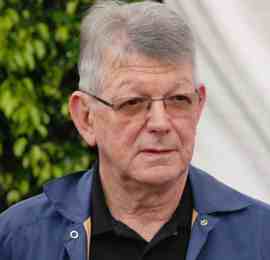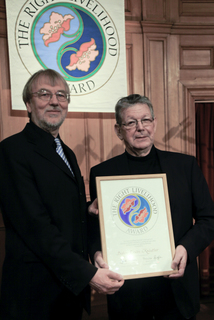Dom Erwin receives Alternative Nobel Prize
Award is recognition for his work in struggle and dedication to the indigenous peoples and the Brazilian Amazon
Read the acceptance speech of bishop Kräutler here.
 Dom Erwin Kräutler, bishop of the Prelature of Xingu, in Altamira, Pará, and president of the Indigenous Missionary Council (CIMI) received Monday, December 6, the Alternative Nobel Prize organized by the Swedish Right Livelihood Prize Foundation. The award recognizes the long standing and dedicated work of the bishop together with the indigenous peoples and the poor in the Brazilian Amazon.
Dom Erwin Kräutler, bishop of the Prelature of Xingu, in Altamira, Pará, and president of the Indigenous Missionary Council (CIMI) received Monday, December 6, the Alternative Nobel Prize organized by the Swedish Right Livelihood Prize Foundation. The award recognizes the long standing and dedicated work of the bishop together with the indigenous peoples and the poor in the Brazilian Amazon.
The awards ceremony, held in the Swedish Parliament, was broadcast live over the Internet and can be accessed through the website www.rightlivelihood.org.
For bishop Erwin, the award brings joy because it brings recognition to the struggle of all who work for the rights of indigenous populations and also from Amazon. "I am honored with the award at a time when our struggle on behalf of indigenous peoples is taking on new dimensions and greater importance in the face of development projects that threaten the Amazon," he said in his speech.
In his speech Dom Erwin said he is accepting the award on behalf of those who fight with him, on behalf of the indigenous peoples of Amazonia and human rights. He adds: "I accept it also in the name of scores of people who gave their lives, whose blood was shed and who were brutally murdered because they opposed the systematic destruction of the Amazon."
A life for life
Dom Erwin Kräutler was born in Austria in 1939, became a priest in 1964 and soon after went to Brazil as a missionary. In 1978, he became a Brazilian citizen (while also keeping his Austrian citizenship). He worked among the peoples of the Xingu, which includes indigenous peoples of different ethnicities. In 1980, Dom Erwin was appointed bishop of the Xingu, Brazil’s largest diocese. Between1983-1991 and since 2006 he has been president of the Indigenous Missionary Council (CIMI), an entity linked to the National Conference of Bishops of Brazil (CNBB).
The work of Dom Erwin is guided by the teachings of the theology of liberation. He teaches that a Christian has to side with the weak and oppose those who exploit them.
Rights of indigenous peoples
For five centuries, the indigenous population of Brazil dropped sharply – and the downward trend continues. Today the causes are well known and documented, including direct violence (but rarely investigated) in connection with the appropriation of indigenous lands, the lands grabbed for energy, mining, industry, agribusiness and military projects.
During the presidency of Dom Erwin Kräutler, CIMI has become one of the most important defenders of indigenous rights, focusing on land rights, self-organization and health care in indigenous territories. In 1988, intense lobbying by CIMI contributed to the inclusion of the rights of indigenous peoples in the Brazilian Constitution. The Council has also raised awareness within the Church regarding indigenous peoples and their rights.
Since 1992, besides the work with CIMI, Kräutler has continued to work tirelessly in defense of the Xingu. The projects that he initiated include the construction of houses for the poor functioning of schools, construction of a facility for mothers, pregnant women and children, founding a "refuge" for recovery after hospital treatment, emergency assistance, legal support and work on farmers’ rights and demarcation of indigenous lands.
In opposition to Belo Monte
For 30 years, Kräutler has been very active in the fight against the plans of huge Belo Monte dam on the Xingu River, today strongly promoted by President Lula, who may be the third largest dam in the world. The dam could destroy 1000 km square of forest, inundating a third of Altamira (PA) and creating a lake of stagnant water infested with mosquitoes of circa 500 square kilometers, which makes life in the city itself, very difficult. About 30,000 people would have to be relocated.
Threats
The commitment and frankness of Dom Erwin put his life at constant risk. In October 1987, several months before the decision to grant full civil rights for indigenous people in the constituent assembly, he was seriously injured in a car accident, probably planned. Since 2006, Kräutler has been under police protection, partly because he insisted on an investigation following the murder of environmental activist Sister Dorothy Stang in 2005, which since 1982, has worked at the side of Dom Erwin. More recently, he has received death threats because of his opposition to the Belo Monte dam and because he took legal action against a criminal group involved in sexual abuse of minors in Altamira.
Prizes and books
In 1989, Kräutler received Grosser Preis für Natur-und Umweltschutz Binding (Principality of Liechtenstein) and in 2009 an honorary doctorate from the University of Salzburg, Austria. In the citation, Kräutler is called "personification of the indignation in opposition to the social conditions that violate human dignity and the hope that another world is certainly possible".
Kräutler has written a series of books, most recently “Flowers as red as blood: A bishop between Life and Death, published in German in 2009.
Awards
The other award laureates were the Israeli organization "Physicians for Human Rights-Israel", which operates in Israel in Palestine, the Nigerian Nnimmo Bassey, 52, who "revealed the ecological and human horrors of oil production," Nepalese Shrikrishna Upadhyay, 65, in conjunction with the organization Sappros which "works against the multiple causes of poverty," according to the jury.
 Right Livelihood Awards
Right Livelihood Awards
Founded in 1980, the Right Livelihood Award is presented for the 31st time this year. The total prize is 200,000 euros, shared by all four recipients. This year, there were 120 proposals from 51 countries, including 69 candidates from "developing" countries. There are now 141 winners from 59 countries.
Foto: Bishop Erwin with the founder of the Right Livelihood Awards

